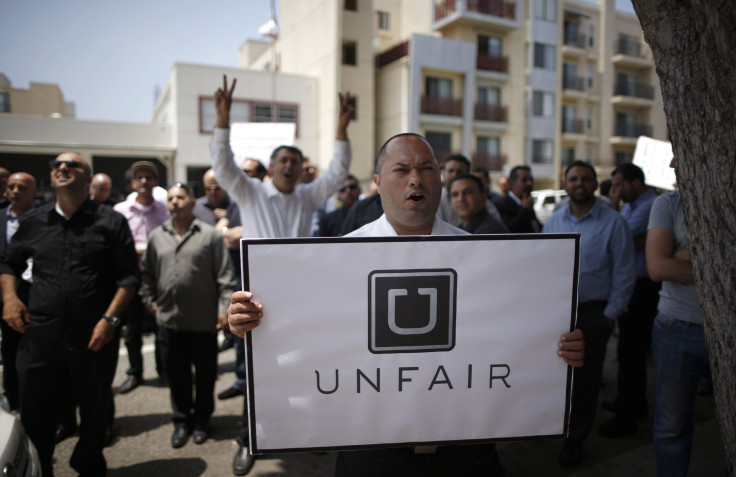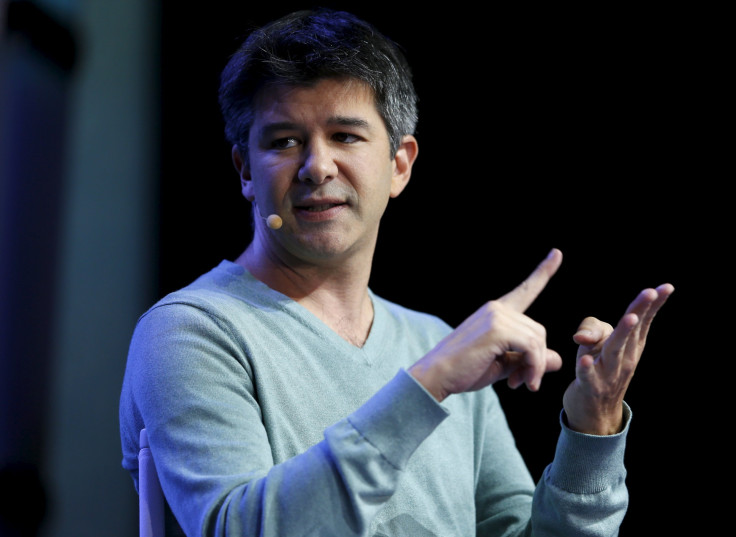Uber And Lyft May Need A New Category To Describe Their Workers

Apps, to borrow Silicon Valley’s mot du jour, have disrupted more than just old-school business owners. Today, nearly all the workers who sustain booming on-demand giants such as Uber, Lyft and GrubHub lack the sort of basic labor rights and protections that most Americans take for granted.
As independent contractors -- rather than employees -- most gig economy workers are not eligible for the minimum wage or overtime pay. So companies that contract with them are off the hook when it comes to paying contributions to Social Security, Medicare, workers’ compensation, and unemployment insurance. This has ignited a ferocious debate between businesses and labor advocates: The former say the independent contractor label fits these non-traditional jobs; the latter maintain bosses are sidestepping the law to save money.
Now, a couple of economists have proposed a middle ground.
In a paper released by the Brookings Institution last week, Seth Harris of Cornell University and Alan Krueger of Princeton University argue for the creation of a new, third category of worker dubbed the “independent worker.”
The plan comes amid a wave of efforts to introduce basic employment and labor rights to workers in the gig economy.
On Monday, with a unanimous vote in the city council, Seattle became the first city to allow Uber and Lyft drivers to bargain collectively. Both companies had opposed the legislation. Another recent report from the National Employment Law Project suggests lawmakers extend protections like unemployment insurance and workers’ compensation to independent contractors.
The Plan
There’s no firm data on how many workers are in the gig economy. Some maintain the number of freelancers overall is as high as 54 million -- and growing rapidly. Others point to data from the Bureau of Labor Statistics, which show just 9.4 million “self-employed” workers and no marked increase over the past year.
According to Harris and Krueger, about 600,000 people -- or 0.4 percent of the total U.S. labor force -- work for what they call an “online intermediary” in the gig economy. These workers, they argue, are neither full employees nor independent contractors.
Unlike traditional employees, Harris and Krueger say, “independent workers” do not work set hours. Some work for one company, others might work for multiple companies.
On the other hand, when gig economy workers choose to put in labor, they tend to follow stringent standards imposed by their bosses: Drivers must charge customers a certain amount, for instance. They retain little ability to personally negotiate changes to any terms and conditions of their working relationship and, of course, they can be "fired" for veering too far from these terms.
Under the proposed “independent worker” designation, gig economy workers would benefit from some, but not all, of the traditional employment protections: They would remain barred from minimum wage and overtime regulations, because they do not work regular schedules. But like traditional employees, “independent workers” would be covered by civil rights protections and enjoy the ability to to collectively bargain. Companies that use “independent workers” would also have to fork over payroll taxes. Harris and Kruger advocate for federal legislation to make these changes.
Uber and Lyft did not respond to a request for comment on Harris and Kruger's plan.
More Trouble Than It’s Worth?
Some remain skeptical, worrying the plan adds an unnecessary layer of confusion to an already complex debate.
“It’s an interesting intellectual exercise but it wouldn’t be wise to actually legislate on this right now,” says Ross Eisenbrey, vice president of the Economic Policy Institute, a labor-backed think tank. He argues that policymakers should let ongoing worker classification disputes play in out in the courts before rushing to make any new categories.
In addition to Uber and Lyft, current and former workers have sued food delivery service GrubHub, courier provider Postmates and the on-demand valet app Zirx, among others, arguing they were misclassified as independent contractors.
“It hasn’t been determined yet whether they are or are not employees,” Eisenbrey says. “I would say don’t jump in and presume they’re not employees and give them lesser rights.”

In the recent high-profile class-action lawsuit against Uber, for example, Eisenbrey says the facts point to a ruling in favor of drivers. The creation of a new category would undercut such a ruling.
“If I were the judge deciding the case, I’d look at the economic realities of it and say Uber can hire and fire them,” he says. “Just on the economic realities of the situation, I would say these people are working for Uber. They are employees.”
Rebecca Smith, deputy director of the left-leaning National Employment Law Project, says a new category would encourage more misclassification “as companies race to reclassify their workers in order to avoid accountability.”
In other words, if employers already mislabel employees as independent contractors, what’s to stop them from calling some employees “independent workers” in a bid to save extra cash?
Alan Krueger, the plan’s co-author, rejects that critique. “Since independent workers would be covered by most of the social contract, employers would gain very little from switching their employees to independent worker status, and would have to cede much control,” he says.
The Costs To Uber
With 400,000 drivers in the United States, Uber is, by far, the largest employer in what Krueger and Harris identify as the on-demand economy. It remains unclear how switching drivers to a new “independent worker” designation would affect the company’s business model -- though it would almost certainly increase labor costs.
As the world’s most valuable startup, Uber’s last round of funding valued the company at $51 billion and investors are looking at raising more. (By comparison, automaker General Motors has a market value of $55 billion.)
Some have speculated that a negative ruling against Uber in the class-action lawsuit would effectively destroy the company’s business model. Others maintain the company would be just fine, although it would face a higher share of labor costs. The trial is slated to kick off in June.
© Copyright IBTimes 2024. All rights reserved.





















